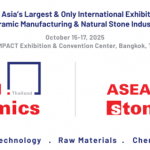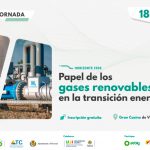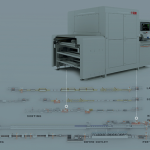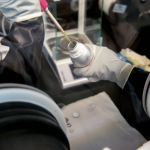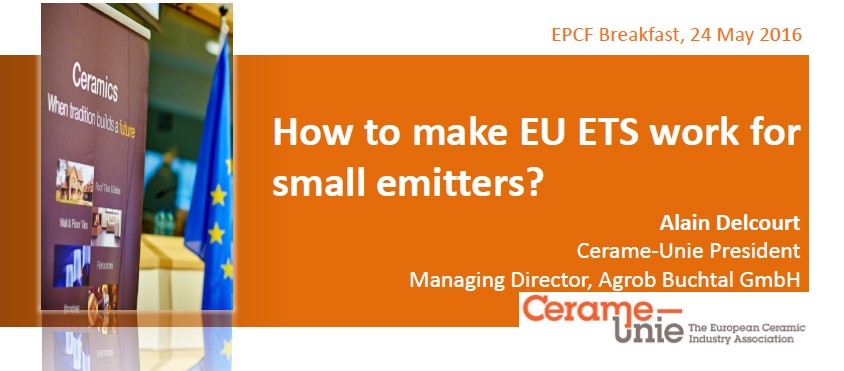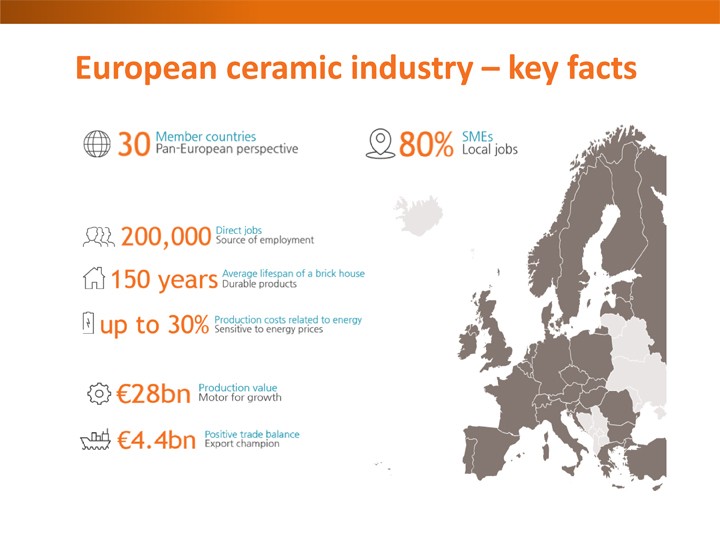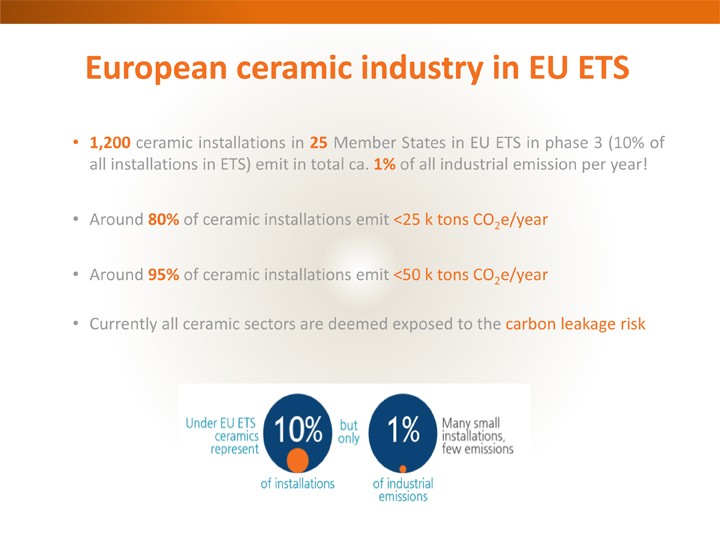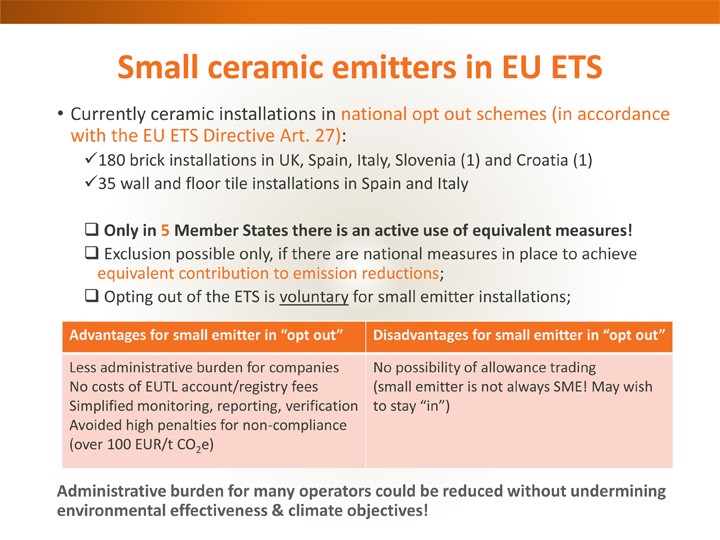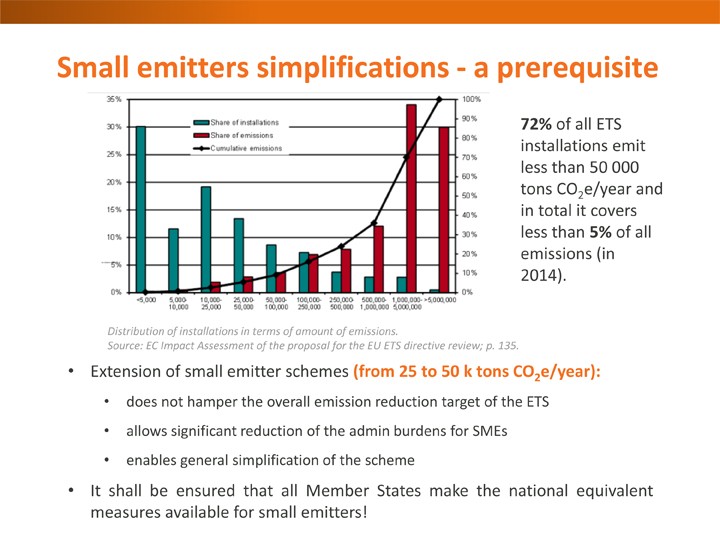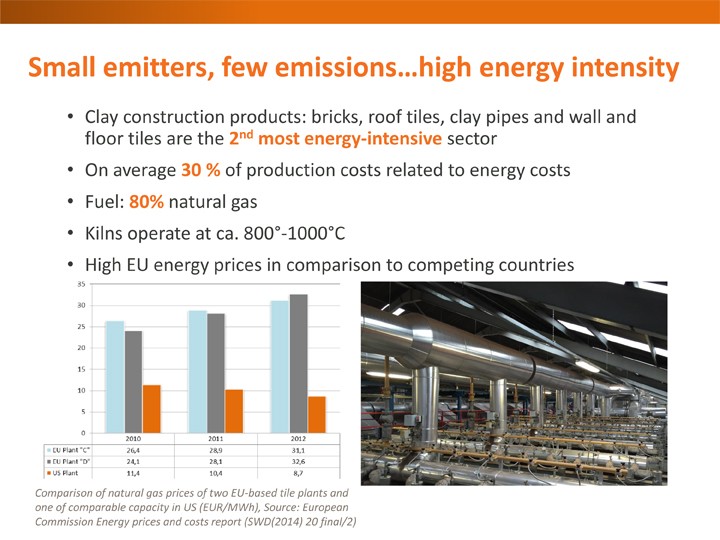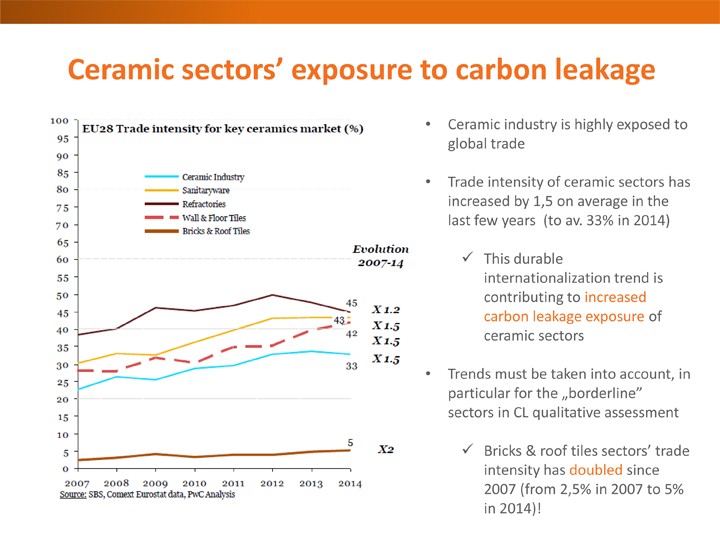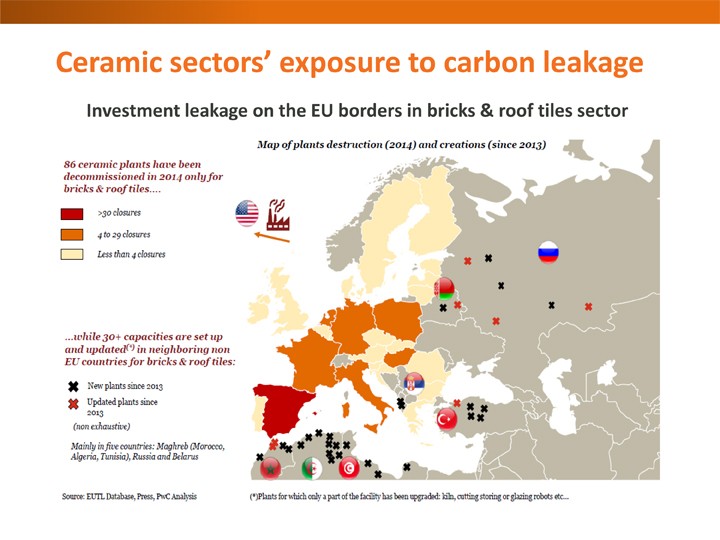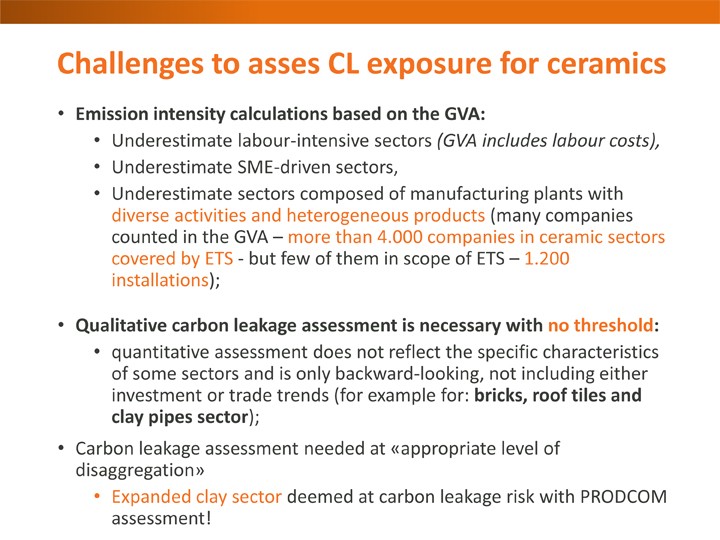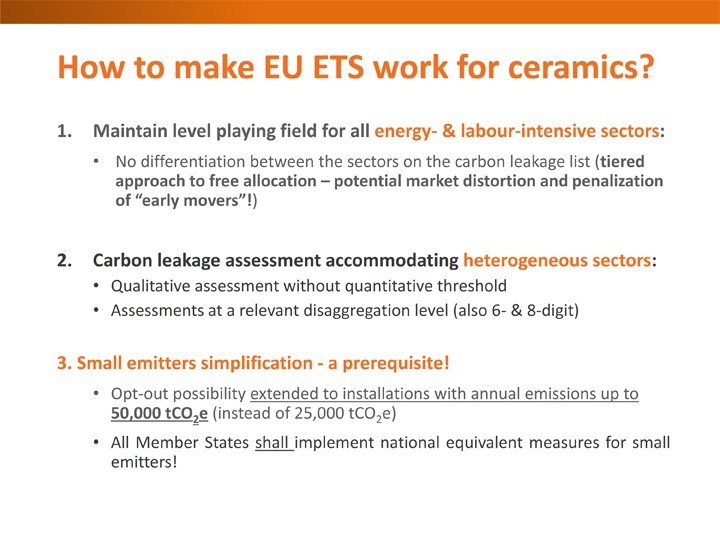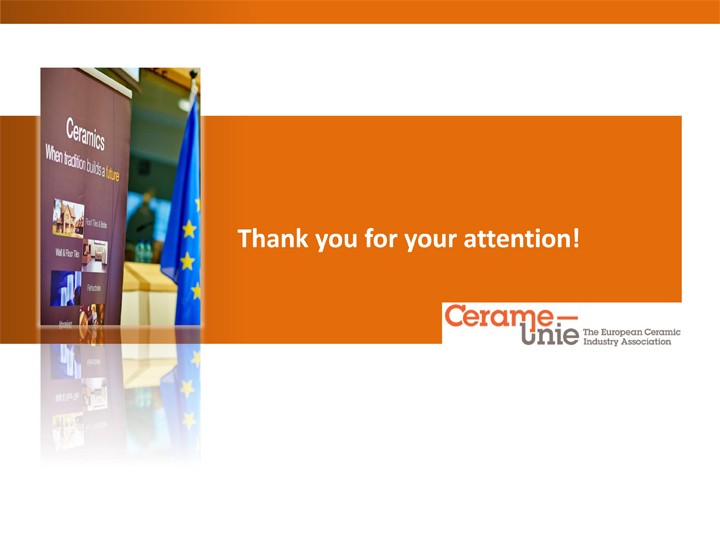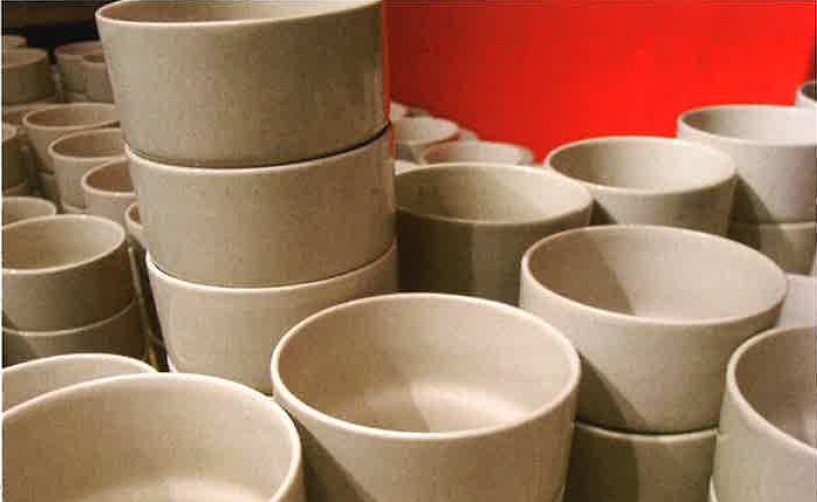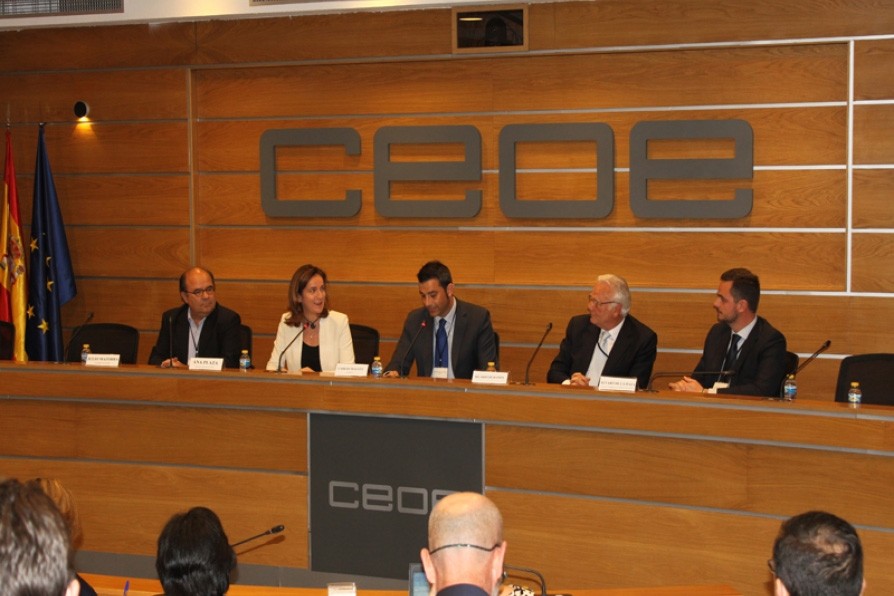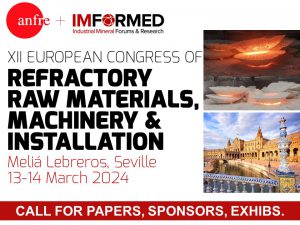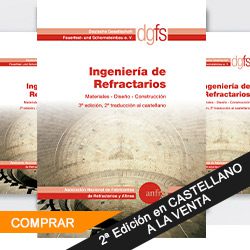May 18
VIII CONGRESO DE MATERIAS PRIMAS, MAQUINARIA Y MONTAJE
HORARIO PONENCIAS
29 Junio 2016
8.30 h. Entrega de acreditaciones
9.00 – 9.15 – Apertura del Congreso. Bienvenida del Presidente de ANFRE
9.15 – 10.00 – Ponencia de Unesid. “ La Siderurgía en España. Influencia de China en materias primas”.
Alfonso Hidalgo
10.00 – 10.30 – Ponencia de IMCD. “ Percepciones y características de materias primas electrofundidas y
sinterizadas”- José Bayón Álvarez
10.30 – 11.00 – Ponencia de Calucem. “ Improvement of the binder system of Refractory castables with
advanced Calcium Aluminate Cements”. Nikolaus Kreuels, Holger Schaffhauser.
11.00- 11.30 – Coffee Break
11.30 – 12.00 – Ponencia Kerneos. “ Mechanisms of castable dispersión in cost adapted formulations”
Fabien Simonin.
12.00 – 12.30 – Ponencia Gorka Cement. “ Las propiedades de los hormigones refractarios de alto
rendimiento fabricados con nuevos ligantes minerales”. Wojciech Kagan y Tomasz Turski
12.30 – 13.00 – Ponencia Imerys. “ Raw material purity and its impact the performance of refractory
products”. Danilo Frulli
13.00 – 13.30 – Ponencia Arcichamotas. “ Desarrollo de chamotas y mullitas a partir de materias primas
nacionales”. Celestino González
13.30 – 15.30 – Comida
15.30 – 16.15 – Ponencia Oficemen. “ La industria española del Cemento”. Ricardo López
16.15- 16.45 – Ponencia Elkem. “ Productos innovadores de Elkem basados en Partículas Microesféricas”.
José Ramón Luna
16.45 – 17.15 – Ponencia Exclusivas energéticas. “ Mercados energéticos, la importancia del momento de la
compra y la información en las negociaciones con las compañías energéticas”. Marc Crespi
17.15 – 18.00/18.30 – Mesa redonda de Materias Primas. Cierre de Congreso
May 10
An exclusive interview with Mr Jose M. Dominguez, General Manager of Refractarios Alfran, Aldomer Group and actual Chairman of PRE
 Refwin: As we know, refractories market in Europe has been stable for years, with annual output ranging over 3.5-4.5 million tons during the last five years. How did it perfom in 2015 since it is a tougher year for the overall refractories industry worldwide?
Refwin: As we know, refractories market in Europe has been stable for years, with annual output ranging over 3.5-4.5 million tons during the last five years. How did it perfom in 2015 since it is a tougher year for the overall refractories industry worldwide?
The production in 2015 has increased in number of tons in Germany by 4% but the sales in euros has decreased by 3%, what shows a decrease in selling prices. In Spain, production has decreased by 3% and the positive figure comes from Poland with an increase in production of 2%, even though there was no increase in Million € sales in this country. In any case, final accumulated 2015 figures from PRE are still not available.
Even though demand was somehow stable in Europe, as you say, we must also consider that in the last 10 years, raw materials prices for Europe have increased above 30% and selling prices have decreased considerably, in most European countries, and therefore the tough environment is neither new nor uncommon for our industry. Cost reductions and innovative management has been and will be the key for refractory industry survival in Europe.
Refwin: Under the economic downturn, what are the main challenges or risks for European refractories manufacturers?
Overcapacity in several customer industries, especially steel, but also glass and cement is a big risk, as it seriously affects the demand. As a result there will be a pressure for cost reduction as customers are not so focused on high value added products but more to low price materials.
Environmental and trade regulations from the EU will continue to impact the European refractory industry and it is a big challenge to adapt to them, more even if we consider that other Regions are no so strict on their policies. It will create an unfair competition but, at the same time it will encourage the European industry to be more innovative and competitive.
Refwin: It is reported that there are some production halts and shutdowns in Europe resulting from China steel and refractories exports. How about your opinion?
China has added a big production capacity to their steel industry in the last decade to support their internal growth but now, due to a decrease on domestic demand, a huge quantity of steel has been brought to the international market at very low prices and this is resulting in steel plants shut-downs in Europe. We can establish a parallelism with the refractory industry itself, which will lead to a process of restructuring and concentration or close down.
In any case European Union must support a fair trade and equivalent environmental regulations with China, as well as with others.
Refwin: How do you evaluate the advantages of European enterprises, product and technology?
Historically, most of the biggest refractory giants where European and that has given the European industry an advantage in R+D to produce high value added materials. Now there is an obvious trend for them to allocate their production facilities in China, where there is a better access to raw materials. In any case, 50% of European refractory companies are SME´s and these will need to either grow, merge or focus on niche markets to make their business sustainable. An advantage for smaller companies is that it is easier for them to develop tailor made products and to be more customer service oriented, including the installation of
their own materials.
Refwin: In the medium term, what can we expect for the development trend of global refractories industry?
The fallen of the oil price brings uncertainty. It will mean a cost reduction in energy for industries like steel, aluminum and cement but it will also affect negatively because of the reduction in investments in Oil & Gas industry. If we look at specific countries, some American nations like Brazil, Venezuela, Mexico and Canada will be affected by an oil low price as well as Nigeria and Russia. As a consequence, global refractory industry will also be affected.
The refractory industry will become more global and consolidated. We need to focus our strategy on the circular economy, using more recycled materials as the all world should walk towards a sustainable and environmentally friendly one. I think that Africa, Middle East and Asia will continue to grow, and China will have a key role in the industry.
In my personal opinion, global companies with vertical integration and lower costs will prevail in one end, and those focused on high value added niches with a very customer oriented service will also be successful on the other end.
http://www.refwin.com/news/viewnew.asp?id=24349
May 09
ANA PLAZA DESTACA LOS BENEFICIOS QUE PARA LA ECONOMÍA ESPAÑOLA TRAERÍA EL TTIP
La secretaria general de CEOE, Ana Plaza, ha destacado los beneficios que traería el Tratado Transatlántico de Comercio e Inversión, TTIP, al comercio europeo en general y, en concreto, a la economía española. Ha señalado, en este sentido, que el acuerdo haría que el PIB español pudiera crecer en el entorno del 0,7% y que se crearan más de 83.000 empleos al año, durante su intervención en la mesa redonda que sobre “los retos de la actividad empresarial en España” ha organizado la Confederación Empresarial española del Vidrio y la Cerámica en CEOE.
Ana Plaza ha subrayado que este acuerdo entre la UE y EEUU debe firmarse pronto pero siempre y cuando se dejen bien cerrados los flecos del mismo. Durante la mesa redonda también se ha analizado el efecto de los costes energéticos en la industria española, como otro de los retos de la actividad empresarial y Ana Plaza se ha referido al descenso del precio del petróleo como un factor importante, junto a la bajada de los tipos de interés, a la hora de que España ahorrara 12.000 millones de euros y ha resaltado que nuestro país importa las dos terceras partes de la energía que consume y que, en el caso del petróleo la importación es del 100%.
Sobre el desarrollo sostenible, cuestión que también se ha debatido en la mesa redonda, ha indicado que debe estar inserto en el ámbito de la responsabilidad social empresarial y que ha de entenderse como una actitud y no como un sello o memoria que se le conceda a la empresa o institución de que se trate. Afirmó que desde las empresas se debe ver como una oportunidad y no como una traba u obligación más que tenemos que cumplir.
En la mesa redonda participaron también Álvaro de la Haza, consejero delegado de Consentino Group; Julio Mazorra, presidente de ANFRE; Ricardo de Ramón, ex directivo de Saint-Gobain y Carlos Mallén, presidente de ANAREVI, que hizo de moderador de la misma.


